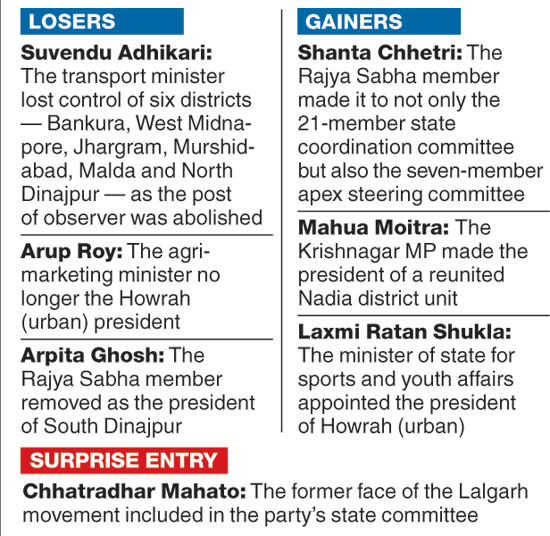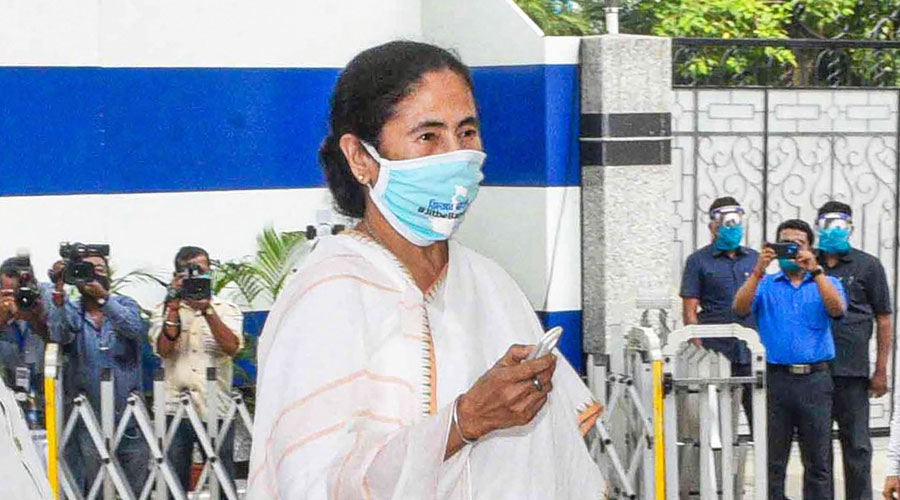Mamata Banerjee made a major reshuffle in the organisational structure of the Trinamul Congress on Thursday through formation of new committees, removal of powerful posts of observers and replacement of several district presidents among others.
The revamp bore the imprint of Trinamul’s poll strategist Prashant Kishor and a departure from the tradition of minor tweaks in the organisation without unsettling the status quo.
Mamata announced the constitution of a steering committee, a 21-member state co-ordination committee and new chiefs of district committees and various wings of the party.
The steering committee will be the apex body of the party with seven members who are also included in the co-ordination committee.
The seven are the party’s de facto Number Two Abhishek Banerjee, state president Subrata Bakshi, ministers Partha Chatterjee, Suvendu Adhikari, Firhad Hakim,Serampore MP Kalyan Banerjee and Rajya Sabha member Shanta Chhetri.
The existing state committee will continue to be headed by Bengal Trinamul president Bakshi and secretary-general Partha Chatterjee
Multiple sources in Trinamul said a major feature of the overhaul was the abolition of the post of observer for districts.
“Getting rid of the observer model is a significant change that would be welcomed by Trinamul functionaries in districts,” said a leader.
“Having a handful of leaders such as Suvendu Adhikari, Firhad Hakim and Aroop Biswas calling the shots in every corner of the state as observers was resulting in confusion and inner-party conflicts,” he added.

While the abolition of the post of observers indicates that the decision making in most cases would be much more centralised, it remains to be seen whether the inner-party conflicts — considered Trinamul’s Achilles heel — will come down in the coming days.
Sources in Trinamul said the abolition of the observer post would cost leaders like Adhikari dearly. “You never know, this may result in more conflicts in the party,” said a source.
Adhikari, however, made it to the apex steering committee.
The Trinamul chief had said in her July 21 address that she would announce major changes in the organisation on Thursday to rejuvenate the party.
“She (Mamata) shuffled the organisation to send out a message that she was being sincere in her promise to make major changes. But she was apparently motivated by Team PK and influenced by the feedback structure it had established,” said a minister.
Although there were few surprises in the apex steering committee which is meant to assist the chief minister in overseeing the party’s journey to the Assembly polls, she was able to give out a key message of having the will to undertake steps to rectify in letdown areas.
“I don’t remember seeing so many changes — even if some were only cosmetic — in a single day in the party. I think it can, safely, be called unprecedented,” said a
senior minister who has been with Trinamul since its inception.
A senior MLA from North 24-Parganas explained that Mamata had the compulsion of being seen as doing “something major” with months remaining before the Assembly polls. More so in the context of the Lok Sabha polls last year, where the BJP won 18 of 42 seats in Bengal.
“Most importantly, the BJP had secured leads in 120 (of 294) Assembly segments, mainly in the western districts and north Bengal. So an overhaul, even if superficial, was necessary at those places,” he said.
According to the MLA, poll strategist Kishor had advised Mamata to get rid of the “troublesome” and the “older” lot in the district leaderships and replace them with young and clean leaders. “This is what explains appointment of minister of state Laxmi Ratan Shukla as Howrah (urban) president by replacing veteran minister Arup Roy.’
“But that’s where she and PK struck a deft balance by introducing the post of chairman for every district. Arupda, for instance, was made the chairman of Howrah (urban). The post of chairman is only ornamental but it will keep seniors pleased,” the MLA added.










